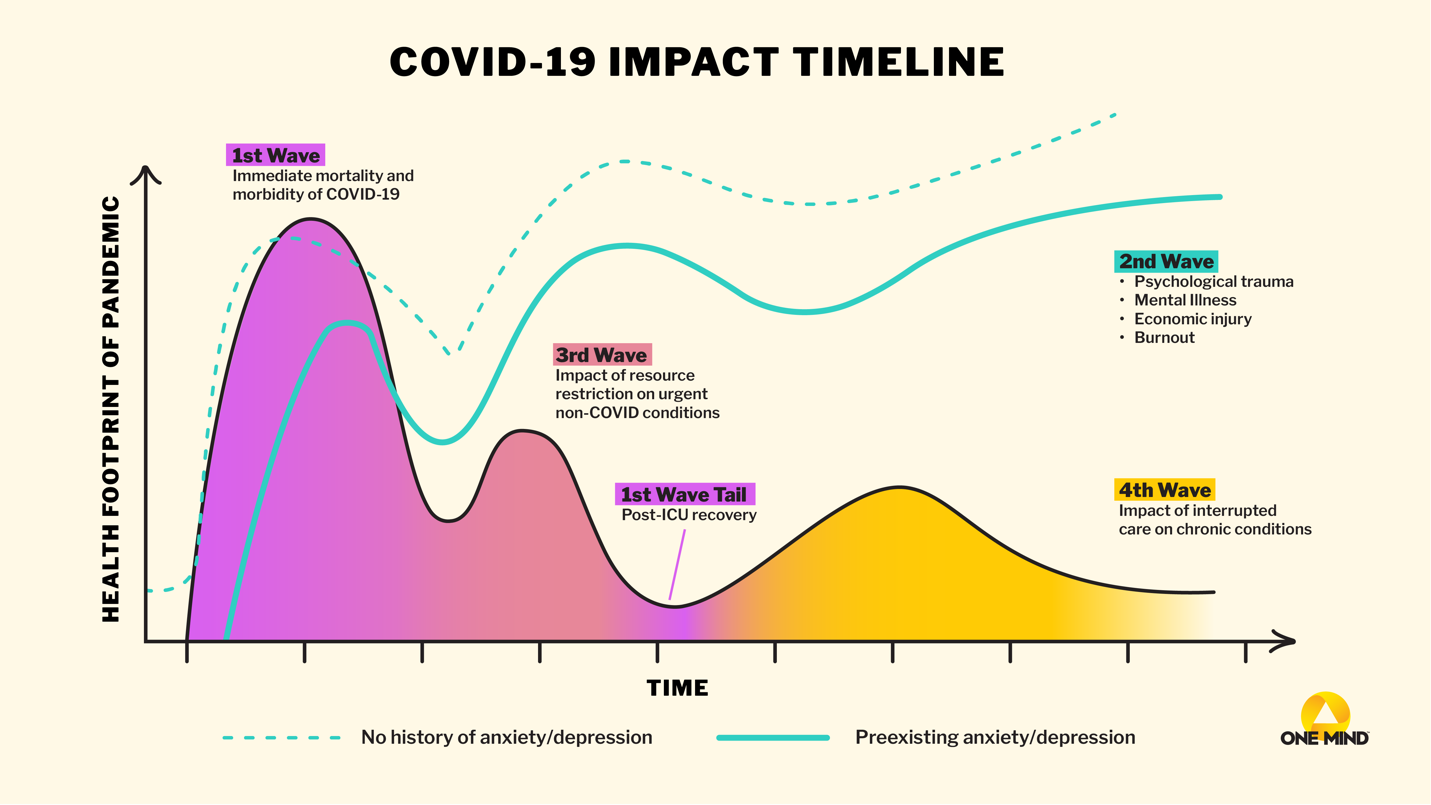
As part of our webinar series “Emerge Stronger from COVID – 19” where we unpack NCD -related issues in COVID times, we held an important dialogue 12 May 2020 with Garen Staglin, founder One Mind (onemind.org) and One Mind at Work, on the Mental Health Fall Out from COVID -19. Some of the big questions we were pondering were covered in advance on Thrive Global.
The May 12 webinar covered a lot of ground, kept everyone engaged throughout and genuinely gave us concerned global citizens all food for thought. Garen Staglin’s story and his mission were inspirational and filled us with hope. Those who missed the webinar can write to us at [email protected] and we will send them the recording.
COVID-19 Fall Out: Surge in Mental Health Problems
One key output from this session was this slide from One Mind showing a surge in mental health problems in the US as a fall-out from COVID-19. The solid blue line shows increasing intensity of problems in those with known mental illness and the dashed line shows heightened anxiety and illness in those who had shown no symptoms before. The surge is happening NOW and will be long lasting and will make more demands on the healthcare system as the months and years go by. Contributing to this surge is anxiety about jobs, uncertainty about the future, and what the new normal will be, and fear and loneliness and isolation.

Many things can help America cope with this surge:
- Insurance restrictions on tele-therapy have been lifted during COVID times. If that continues post-COVID, it can ease some of the pressure on the healthcare system, and help those seeking care, get it. A Coalition of 12 leading non profits has written to Congress requesting additional funding for behavioral health providers and telehealth.
- Leverage digital therapies. One Mind’s Psyberguide https://onemind.org/psyberguide/ ranks 400 tech applications for their efficacy in helping people cope with mental illness.
- Employers have a responsibility to tackle mental health in the workplace. 1 in 3 working-age Americans are affected by mental illness, and these diseases result in $24 bn dollars of lost productivity. One Mind At Work is making great strides in this regard, mobilizing CEOs with arguments about why investment in mental health makes good business sense. https://onemind.org/onemindatwork
As people return to work, in addition to deciding whether to get people back in shifts, companies must also actively promote to employees all resources they may have already set up: peer counselors, EAP services, daycare, etc. This time around this knowledge is a must, to ease employee stress as they return to work.
- More medical training is called for. Front line health workers have always borne a disproportionate rate of anxiety and depression (one estimate is it is at 40% in the healthcare industry). Doctors and nurses are distressed because they cant always fulfill their oath to heal people, during these Covid times. One Mind’s Heroes Health assessment effort is commendable – they will soon launch a pilot with a major tech company to see if a short weekly phone questionnaire will be helpful to protect the mental health of health workers.
- Reduce stigma around mental health. Through their annual music festival that has mobilized all of Napa around science, and wine and music, for the last 25 years, a Ken Burns docu series and their forthcoming 3-day telecast with musicians and celebrities, One Mind is making a huge effort to reduce stigma and increase awareness that mental health is better framed as brain health.
- Is this a global movement? Yes. More investment is needed in every country. Countries typically invest 0.5% GDP or less in tackling mental illness, but the impact of lost productivity from these serious diseases is 4-5% GDP. Garen mentioned Shekhar Saxena from Harvard and his view that from a mental health perspective, every country is a developing country –so much needs to be done. But we must also make better use of existing resources.
- Other points about the impact on young people and women were also discussed.
Some lasting lessons from the webinar:
- Don’t run away from a problem, run towards it. Confront it and do something about it.
- Everyone is affected directly or indirectly by brain illness today. It knows no geographic or economic boundaries. Empathy is the need of the hour.
- There is no shame in mental illness. And no blame. We can all seek help.
We wish Garen Staglin, the One Mind team and all those working in the mental health space, the best for their hard work and future endeavors.
We are relieved that the UN and WHO are paying attention to this crisis with a much-needed Call to Action – and we hope more countries will respond.
We invite all in the to participate in our webinars on May 23, June 6 and all the ones we will offer in the future. Learn more.

